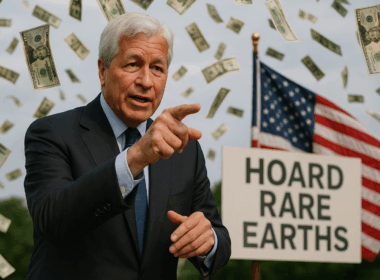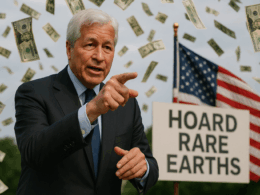What an odd start to 2024. While the undertones of negativity run rampant, we can’t help but feel a sense of optimism – or rather urgency – in being opportunistic.
It’s almost as if we’ve hit rock bottom, and are ready to bounce back up. The S&P 500 continues to climb, despite rising rates.
Perhaps Americans are excited that Trump could lead the economy back on solid footing.
Perhaps Canadians are excited that citizens are waking up to just how poorly Canada has been under Trudeau.
Perhaps Argentinians are finally ready to push forward and grow under a non-socialist leader.
When the pendulum swings far one way, it always makes its way back to the other side.
Many years ago, the World Economic Forum at Davos was viewed as a respected gathering of the world’s most powerful people to bring prosperity through global economic collaborations.
Today, it’s being viewed as a gathering of totalitarian authorities where the world’s most powerful people unite to dictate global policies of control.
Not long ago, the COVID mRNA vaccines were thought to be entirely safe and prevented transmission of the disease.
Today, we’re learning of all the new adverse reactions, and how the mRNA vaccines don’t really prevent transmission, as traditional vaccines once did. Heck, we’re even learning now that there are DNA fragments in some of the vaccines – which was a conspiracy just a few months ago.
The point is that we need to be open to looking at things from a different perspective.
It could change your life.
And perhaps make you money.
How a Different Perspective Led to Billions
Every year during the holidays, we like to republish a story that our long time Equedia Letter subscribers have heard before. It has become so popular amongst our readers that it is now a tradition here at Equedia for us to publish this story every year before the new year begins.
We missed it this year, but as the saying goes, “it’s never too late.”
So today, given how we are encouraging you to view things from a different perspective, it’s only fitting we revisit this incredible story.
It’s a story about how changing perspective – how one man’s deviance of conventional wisdom turned a failing corporation into one of the world’s largest gold producers.
We call this story, “The Gold Hero.”
The Gold Hero
Rob McEwen wasn’t a miner. He was a young man following his father’s footsteps into the business world. Like his dad, he had a fascination for gold.
After years of growing up hearing stories around the dinner table of miners and prospectors, he finally got his shot.
One day, he stepped into a takeover battle as a white knight and emerged triumphantly as majority owner of a mine in Red Lake, Ontario. Here he stood at the head of the boardroom table filled with a room full of experienced senior geologists, all of whom doubted his ability to lead this company. Who could blame them? He was a mutual fund manager turned CEO of a gold corporation overnight.
But it was hardly a dream come true. The company he had taken over was plagued with negative news and on the brink of failure. The miners were on strike and they were overwhelmed by lingering debts. The gold market was contracting and the mine’s operating costs were exceedingly high, forcing them to cease mining operations. Unless they found evidence of new gold deposits, the fifty-year old mine was about to be shut down along with the company.
McEwen knew that the mine had potential. “The Red Lake gold district had 2 operating gold mines and 13 former mines that had produced more than 18 million ounces combined,” he says. “The mine next door had produced about 10 million ounces. Ours had produced only 3 million.” So he sent his geologists packing with $10 million dollars and a plan to drill in the most remote and deepest parts of the mine.
A few weeks later the geologists returned. With smiles on their faces, they broke the news to McEwen that would save the failing company – at least for another few years. They had found results signalling new deposits of gold as much as thirty times the amount they had been mining at the company. But that wasn’t enough.
The senior staff continued years of further exploration in attempts to find a more accurate depiction of the gold’s value and location. Despite the expertise and experience among the staff of senior geologists, their efforts proved stagnant. It had become obvious that something critical needed to change if they were to secure a future for their company. They needed to act faster.
Exhausted and uncertain about his company’s future, McEwen decided to take a break for some personal development. He attended a MIT conference in 1999, where corporate presidents from around the world had come to learn about advances in information technology. Perched up in his chair, he listened as the lecturer talked about how Linus Torvalds built a masterpiece computer operating system by revealing his code to anonymous programmers all around the world on the internet.
Without the help of thousands of anonymous participants, the Linux system would have cost millions of dollars to produce and would have taken years. But it didn’t.
Then it hit him. If his senior geologists couldn’t find the gold in Red Lake, maybe someone else could.
McEwen wasn’t a miner. He didn’t think like one either. But that was his strength. So he rushed back to his corporate head office in Toronto to share his idea of “open sourced” mining.
McEwen wanted to take all of the data the company has spent creating in the last fifty years and he wanted to share it openly with the world by posting it on the internet: “Then we’ll ask the world to tell us where we’re going to find the next six million ounces of gold.”
At first, the Company’s geologists were appalled at the idea of exposing their fifty years of secret data to the world. And they had good reasons to be. The mining industry is an intensely guarded business and geological data is to miners what treasure is to pirates. Giving this sort of data away could not only subject you to takeover risks, but can also imply that your company no longer has the ability to move forward on its own.
Despite the inherent risks, McEwen decided to push forward and in March 2000, he launched a new “Challenge.” They posted every bit of information they could on their 55,000-acre property through their website and setup a contest offering $575,000 worth of prize money to the participants that could show his Company the best methods and estimates on their property.
McEwen knew this strategy entailed big risks. But the risks of continuing to do things the old way were even greater.
“Mining is one of humanity’s oldest industrial pursuits,” McEwen says. “This is old economy. But a mineral discovery is like a technological discovery. There’s the same rapid creation of wealth as rising expectations improve profitability. If we could find gold faster, we could really improve the value of the company.”
And improve the value they did. Within weeks, submissions from over one thousand virtual prospectors in over fifty countries crunched the data. But geologists weren’t the only participants.
Mathematicians, graduate students, consultants, and military officers all submitted entries. They had, “applied math, advanced physics, intelligent systems, computer graphics, and organic solutions to inorganic problems.”
Not only had the contestants identified new targets on the Red Lake property, they introduced the Company to state-of-the-art technologies and exploration methodologies, including new drilling techniques and data-collection procedures, and more advance approaches to geological modeling.
McEwen had harnessed a technological trend that most in the industry would have shunned. As a result, he turned his destined-for-failure $100 million company into Goldcorp – one of the world’s largest gold producers and a company today worth close to $34 billion.
McEwen’s courage to challenge the mining industry’s safe-keeping of geological data reveals to us that change can lead to astonishing results.
Junior stocks – in particular junior mining stocks – give us ample opportunity to beat the markets, but they can often times be extremely rewarding. So while they have mostly been quiet, especially in Canada, things could change very rapidly.
Despite the poor performance, commodities and precious metals prices remain high. Eventually, fundamentals will overcome fear. It may take a few months, or even a few years, but these low valuations will eventually be reversed.
We are looking forward to 2024 as a year for great opportunity – despite what we believe could be extreme volatility.
Could the powerful elite prop the stock market up to help Biden win another term? Could they be waiting for Trump to come in power, only to topple the markets and blame it on him? Or could Trump become President once again and make the stock market soar?
Regardless of your political views, have an open mind. It just might change your life.
Seek the truth and be prepared,
Carlise Kane













In recent years,many central banks have been exchanging devaluing U.S. Dollars for gold.This is similar to the late 1960’s,early 70’s,when foreign central banks were exchanging Dollars for gold.Gold had a great run during the 1970’s.The same might happen again,showing these central bankers know something.
This is interesting what you wrote Carlise.
Can you answer these 3 questions?
Is this similar to what the company at Black Rock, Vanguard, and State Street are doing?
Thank you